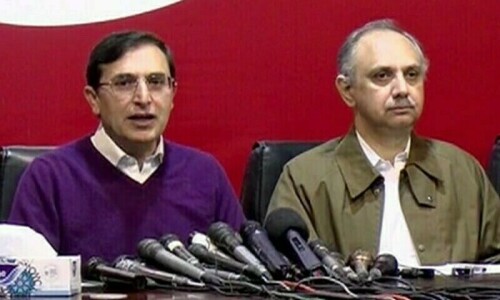WASHINGTON, July 31: CIA chief Michael V. Hayden had an exclusive meeting with Prime Minister Yousuf Raza Gilani during his visit to Washington this week, presenting him with a “charge-sheet” on Pakistani intelligence agencies’ alleged involvement in jihadi activities.
Diplomatic and US sources told Dawn the allegations included in the “charge-sheet” were almost identical to what the New York Times had reported on Wednesday.
“Some information in the CIA charge-sheet were so damning that the Pakistanis could not deny them,” said a senior official familiar with the talks.
The CIA chief — who also met the prime minister at a dinner on Monday — is believed to have told Mr Gilani that Pakistan will have to do something about this alleged involvement of ISI officials with the militants.
He also told the PM that even a change of government in Washington would not help Pakistan as whoever occupied the White House in January would also want Islamabad to “rein in the ISI”, said the official.
In an interview to Washington Times, published on Thursday, Mr Gilani confirmed the New York Times report that CIA deputy director Stephen R. Kappes and Chairman of the Joint Chiefs of Staff Adm. Michael G. Mullen visited Islamabad in mid-July with reports of some ISI officials’ alleged links with the militants.
Asked whether he was confident that the ISI contained no pockets of Taliban sympathy, Mr Gilani said: “I am pretty sure about it.” But, he added: “We will still have to look into (the accusations). … It will be resolved.”
The NYT reported on Wednesday that Mr Kappes had travelled secretly to Islamabad earlier this month to confront Pakistani officials with new information about alleged ties between the ISI and militants operating in Fata.
The CIA emissary presented evidence showing that members of the spy service had deepened their ties with some militant groups that were responsible for a surge of violence in Afghanistan.
Diplomatic sources noted that by leaking this information to the NYT while the Pakistani prime minister was still in Washington, the US administration tried to convince the Pakistanis that they were really upset with Pakistan over this issue.
They also noted that while previous leaks on this issue quoted unnamed sources, this report directly quoted senior CIA officials.
According to diplomatic sources, the United Stats is trying to work out an arrangement with Pakistan for curtailing ISI’s power.
Under this new arrangement, the ISI wing which deals with internal security may be transferred to the interior ministry and the agency may also be asked to reduce its role in the war on terror.
“While the ISI may still have some role in both internal security and the war on terror, it will be not be as influential as it is today”, said an official familiar with the talks. “At least this is what the Americans and Pakistanis hope to achieve.”
That the ISI would figure prominently in the US-Pakistan talks was known to Pakistani media representatives in Washington even before the prime minister came here.
They had learned that while joint statements and press releases would focus on economic cooperation between the two countries; this will not be the focus of the talks.
The Americans, they said, wanted to talk about the ISI because they believed that at least some people within the agency had links to the Taliban and Al Qaeda.
Later, senior Pakistani officials who came with the prime minister also confirmed this, saying that they had come prepared for “tough talks” on this issue.
Yet, the media were not prepared for an on-the-record confirmation. So they were surprised when Defence Minister Ahmad Mukhtar told a private television channel that the US president, during a meeting with a Pakistani delegation, expressed concerns over ISI’s role. He quoted President Bush as complaining that the intelligence shared with Pakistan got leaked much before any action was taken.
The defence minister’s decision to go public with this information apparently shows the government’s desire to let the people in Pakistan know how much international pressure it faces on this issue.
A day before the prime minister arrived, the Cabinet Division issued a formal notification in Islamabad, placing the ISI and the Intelligence Bureau under the interior ministry.
The US media linked this move to the visit but when it was withdrawn, the media reported that the PPP government “buckled in” under the military’s pressure.
Pakistani officials travelling with the prime minister, however, tried to dispel the impression that the Pakistani government was working on some formal or informal arrangement with the US for curtailing ISI’s powers.
They pointed out that during his talks at the White House and later with senior State Department and Pentagon officials as well as with US lawmakers, Prime Minister Gilani urged them to look at the Afghan and India factors as well.
On Wednesday, Rehman Malik, the PM’s Adviser on Interior, publicly blamed the two neighbouring countries for stirring troubles in Fata and Balochistan.
Pakistan officials say that by highlighting India and Afghanistan’s alleged involvement in the troubles, the government is trying to fend off the US attack on the ISI.














































Dear visitor, the comments section is undergoing an overhaul and will return soon.